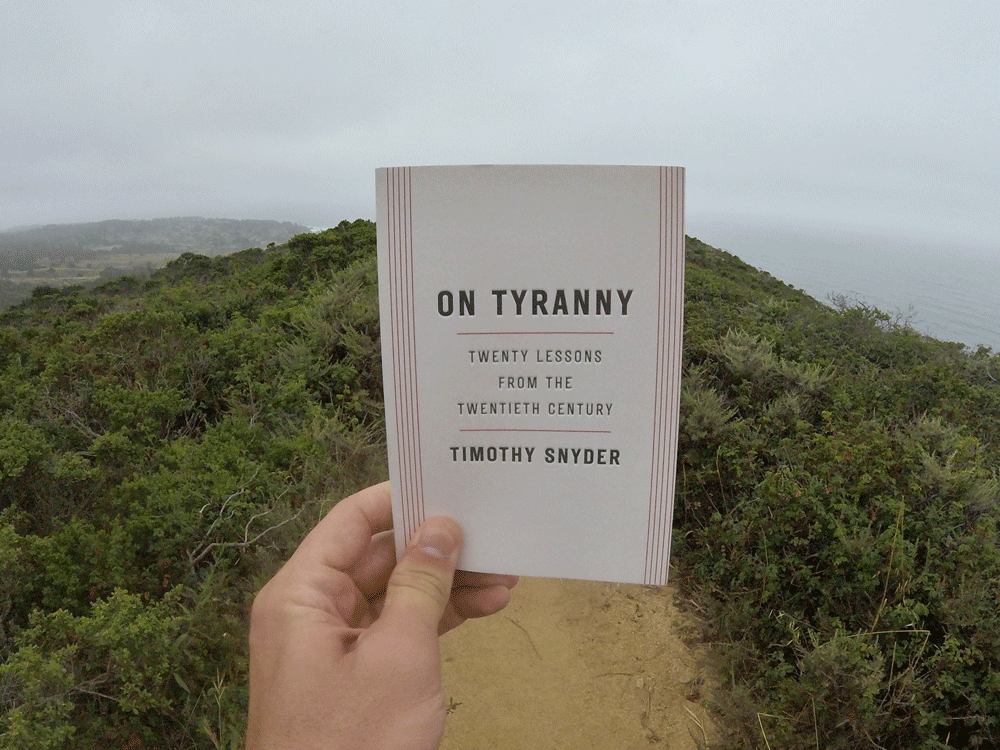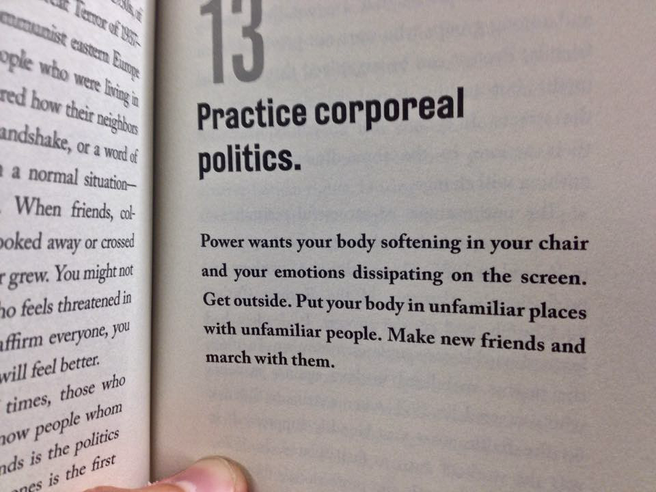"We are no wiser than the Europeans who saw democracy yield
to fascism, Nazism, or communism. Our one advantage
is that we might learn from their experience."
— Timothy Snyder
to fascism, Nazism, or communism. Our one advantage
is that we might learn from their experience."
— Timothy Snyder
On Tyranny: Twenty Lessons from the Twentieth Century is a pocket-sized powerhouse of a read. Looking back two generations to the propaganda of Moscow and Berlin of the '30s and '40s, and then forward to today's Moscow and Washington, Timothy Snyder draws ominous parallels across the Left, Right, and Center of contemporary politics. And perhaps most importantly, the author offers guidance for how to arm oneself against the rise of political authorities.
WHY I LOVE IT
Snyder's On Tyranny examines the timeless tactics employed by political rulers to gain power at the expense of the people. It's not about Trump. Or Putin. Or Hitler and Stalin. For Snyder, it's about reminding a too-insulated generation that peace and prosperity are not automatic, but earned—by keeping authorities in check.
I especially enjoyed the book's Epilogue, which categorized two viewpoints politicians often espouse: the "Politics of Inevitability" and the "Politics of Eternity":
I especially enjoyed the book's Epilogue, which categorized two viewpoints politicians often espouse: the "Politics of Inevitability" and the "Politics of Eternity":
- Politics of Inevitability: "the sense that history could move in only one direction: toward liberal democracy." Snyder argues that since communism's official collapse in 1989-91, we as Americans have "lowered our defenses, constrained our imaginations," and in doing so, leave us vulnerable to the return of history's worst regimes.
- Politics of Eternity: The sense that if the nation would just return to a mythical utopia in the past (which never existed), we'd be better off. We have to go backward to recapture greatness. "If the politics of inevitability is like a coma, the politics of eternity is like a hypnosis: We stare at the spinning vortex of cyclical myth until we fall into a trance—and then we do something shocking at someone else's orders."
ABOUT THE AUTHOR
| Timothy Snyder is the Levin Professor of History at Yale University. He is the author of Bloodlands: Europe Between Hitler and Stalin, and Black Earth: The Holocaust as History and Warning. Snyder is also a member of the Committee on Conscience of the United States Holocaust Memorial Museum and a fellow of the institute for the Human Science in Vienna. |
FAVORITE QUOTES
5. "The politics of inevitability is a self-induced intellectual coma. So long as there was a contest between communist and capitalist system, and so long as the memory of fascism and Nazism was alive, Americans had to pay some attention to history and preserve the concepts that allowed them to imagine alternative futures. Yet once we accepted the politics of inevitability, we assumed that history was no longer relevant. If everything in the past is governed by a known tendency, then there is no need to learn the details."
4. "In the politics of eternity, the seduction by a mythicized past prevents us from thinking about possible futures. The habit of dwelling on victimhood dulls the impulse of self-correction. Since the nation is defined by its inherent virtue rather than by its future potential, politics becomes a discussion of good and evil rather than a discussion of possible solutions to real problems. Since the crisis is permanent, the sense of emergency is always present; planning for the future seems impossible or even disloyal. How can we even think of reform when the enemy is always at the gate?"
3. "To abandon facts is to abandon freedom. If nothing is true, then no one can criticize power, because there is no basis upon which to do so. If nothing is true, then all is spectacle. The biggest wallet pays for the most blinding lights...Post-truth is pre-fascism."
2. "The symbols of today enable the reality of tomorrow. Notice the swastikas and the other signs of hate. Do not look away, and do not get used to them. Remove them yourself and set an example for others to do so..."
1. "Be kind to our language. Avoid pronouncing the phrases everyone does. Think up your own way of speaking, even if only to convey that thing you think everyone is saying. Make an effort to separate yourself from the internet. Read books."
4. "In the politics of eternity, the seduction by a mythicized past prevents us from thinking about possible futures. The habit of dwelling on victimhood dulls the impulse of self-correction. Since the nation is defined by its inherent virtue rather than by its future potential, politics becomes a discussion of good and evil rather than a discussion of possible solutions to real problems. Since the crisis is permanent, the sense of emergency is always present; planning for the future seems impossible or even disloyal. How can we even think of reform when the enemy is always at the gate?"
3. "To abandon facts is to abandon freedom. If nothing is true, then no one can criticize power, because there is no basis upon which to do so. If nothing is true, then all is spectacle. The biggest wallet pays for the most blinding lights...Post-truth is pre-fascism."
2. "The symbols of today enable the reality of tomorrow. Notice the swastikas and the other signs of hate. Do not look away, and do not get used to them. Remove them yourself and set an example for others to do so..."
1. "Be kind to our language. Avoid pronouncing the phrases everyone does. Think up your own way of speaking, even if only to convey that thing you think everyone is saying. Make an effort to separate yourself from the internet. Read books."
"In politics, being deceived is no excuse."
— Leszek Kolakowski
YOU MAY ALSO LIKE
| A War Like No Other Victor Davis Hanson | The Diary of a Young Girl Anne Frank |

























